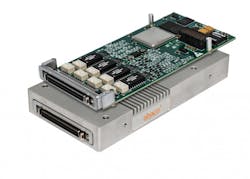Abaco Extends Family of Avionics Devices for Test and Simulation, Flightline, and Development Featuring Thunderbolt 3 Interface
HUNTSVILLE, Ala.— August 8, 2019 Abaco Systems today further extended its range of portable avionics devices that feature the Intel® Thunderbolt™ 3 interface with the addition of an ARINC664-compatible RCNIC-A2PA-TB and multiprotocol RAR15XF-TB that supports up to four channels of MIL-STD-1553 and 18 channels of ARINC 429 on a single device. These new devices complement Abaco’s previously announced QPM-1553-TB and RCEI-830A-TB.
Abaco’s Thunderbolt 3 design delivers maximum flexibility and performance to extend the functionality of existing test systems without adding more slots. It also delivers portability and convenience for test and simulation users and for flight-line use. Typical applications include bus analysis/simulation, system integration activities, and flight-line including 615-3 data loading and MRO (Maintenance, Repair and Overhaul).
ExpressCard™ and PCMCIA slots are disappearing from the portable computers widely used in avionics test and simulation, and have largely been replaced by USB. However, USB latency limits real time interaction with data, and channel density is similarly limited. Neither is desirable in an avionics environment in which low latency and high bandwidth are imperative. The Thunderbolt 3 interface has become a de facto standard interface on new laptops and is a solution that limits neither the performance nor the flexibility of avionics databus adapters. Thunderbolt 3 throughput is at least 4x faster than the highest speed USB connection, and has orders of magnitude lower latency than USB. It provides customers with a stable roadmap into the future, ensures long-term viability and provides performance advantages over USB-based devices.
"In addition, recent government-mandated security requirements have presented a challenge to avionics interface customers in that migrating to newer operating systems and hardware creates significant technical obstacles,” said Peter Thompson, Vice President, Product Management at Abaco Systems. “The RCNIC-A2PA-TB and RAR15XF-TB ease this process by providing support for the Thunderbolt 3 interface, which is widely available across modern systems.”
“Beyond this,” he added, “Power over Thunderbolt 3 simplifies wiring and connections for reduced integration time.”
The RCNIC-A2PA-TB is the first portable ARINC 664 device to come to market with Thunderbolt 3 connectivity. It is a dual port ARINC 664 interface for monitoring, generating or analyzing full-bandwidth AFDX/ARINC 664 Part 7 protocol traffic. Abaco’s exclusive pipeline architecture maximizes packet throughput using parallel controllers and efficient DMA transfers, thereby avoiding the bottlenecks of CPU-based interface
The RAR15XF-TB is the highest density portable MIL-STD-1553 and ARINC 429 device available. It delivers up to four channels of 1553 and 18 channels of ARINC 429 for the highest density in an extremely portable device. Its on-board firmware, large data buffers, and a high-level API are integrated to provide total flexibility in monitoring and generating ARINC bus traffic. Simultaneous scheduled and burst mode (FIFO) messaging is supported on all ARINC 429 transmit channels. Each ARINC 429 receive channel provides simultaneous dedicated and buffered mode storage, along with label/SDI filtering.
Previously announced Abaco portable avionics devices featuring the Thunderbolt 3 interface were the RCEI-830A-TB and the QPM-1553-TB.
The RCEI-830A-TB supports up to 16 Tx and 16 Rx ARINC channels with a range of flexible I/O configurations. It provides complete, integrated databus functionality for ARINC 429, ARINC 615-3 dataloader, ARINC 717, ARINC 575 and selected 2-wire, 32-bit protocols. Configurations with ARINC 717 provide support for both ARINC 717 HBP (Harvard Bi-Phase) and BPRZ (Bi-Polar Return to Zero) across a range of bit rate/sub-frame combinations.
The QPM-1553-TB provides high levels of performance, flexibility and interface density for MIL-STD-1553A/B. Standard features include 1 MByte of RAM per channel, real-time bus playback, aperiodic message insertion, error injection/detection, conditional BC branching, 64-bit, 25 nanosecond message timetagging, and "one-shot" BC operation.
For more information:
About Abaco Systems
With more than 30 years’ experience, Abaco Systems is a global leader in open architecture computing and electronic systems for aerospace, defense and industrial applications. We create innovative, modular solutions based on open standards that are characterized by outstanding price/performance, ultimate rugged reliability and minimal SWaP. Our goal is to be a significant contributor to our customers’ success, partnering with them to reduce cost, time-to-deployment and risk and supporting them over the long term. With an active presence in hundreds of national asset platforms on land, sea and in the air, Abaco Systems is trusted where it matters most. www.abaco.com
For more information, contact:
Ian McMurray
Communications Manager
Abaco Systems
Intel is a registered trademark, and Thunderbolt is a trademark, of Intel Corporation. ExpressCard is a trademark of PCMCIA. All other trademarks are the property of their respective owners
